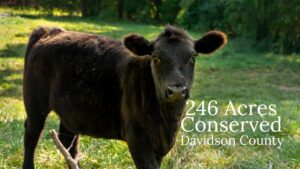
The LandTrust for Central North Carolina entered into the New Year by announcing the commencement of the Leopold Society, their new youth initiative. This passport program sponsors outdoor activities and conservation education so that the participants, grades 6-12, can explore the natural world around them. Participants will receive a passport stamp once each activity is complete. In addition, each year Leopold Society members are required to give back to their community by completing a conservation-based service project. The LandTrust’s Membership and Outreach Director, Ms. Michael Nye, sees The Leopold Society as a way to encourage kids to get outside with their schools and families. “Our mission is to build the next generation of conservationists. As our world becomes more technology based, we must continue to get kids outdoors and back into nature. The Leopold Society will achieve this goal by providing schools, recreation departments, and families with opportunities to get outside and play an active role in conservation.”

On January 17th, The LandTrust sponsored their first Leopold Society event, introducing twenty-two seventh graders from Salisbury Academy to the Kerr 2 Property – a 19.2 acre tract of land in Rowan County. In 2015 this LandTrust property was converted into an American chestnut restoration site in partnership with The American Chestnut Foundation. This project was possible with guidance and funding from the LandTrust’s current ‘Conservationist of the Year’, Mr. Fred Stanback.
Historically, the American chestnut tree was a common sight across the eastern United States and the chestnuts themselves were a primary food source for nearly all wildlife species – from birds to bears. However, in 1904, the Chestnut Blight came to the United States via imported Chinese chestnut trees. The Chinese chestnut had developed immunity to the fungal pathogen; however, the American chestnut was exceedingly susceptible. The Chestnut Blight devastated the American chestnut population, killing approximately 4 billion chestnut trees across the southeastern United

States and nearly wiping out the species altogether. Today, the American Chestnut Foundation is dedicated to reintegrating the American chestnut into the eastern United States landscape. Through genetic modification, they have generated a blight-resistant American chestnut and saplings of this modified species are growing at the Kerr 2 Property.
After learning about the American chestnut in the classroom, the seventh graders from Salisbury Academy, taught by Mrs. Alexandra Shadroui, chose to adopt and maintain the Kerr 2 Property as their Leopold Society service project. “This project is a beautiful partnership that will ensure our students develop a love for nature and a true understanding of the impacts of conservation efforts, so that they can continue on as adults saving and protecting the spaces they love,” explained Mrs. Shadroui.
Their visit to the Kerr 2 Property on January, 17th marked the beginning of a mutually beneficial relationship between the students and the American chestnuts – the saplings receiving much needed attention and the students gaining hands-on experience in field while building a passion for conservation and the outdoors. In a journal reflection after their visit, Hayes Hartpence wrote, “The project is important to me because we can now have the chestnuts back and the pride that we helped bring them back. We help make history.” His classmate John Paul agreed writing, “It was a lot of work, but in 30 years when NC has American chestnut forests, we will be thankful for this.”
For more information or to enroll your school or participant into The LandTrust’s Leopold Society, please contact Sam Parrott at sam@landtrustcnc.org or 704-647-0302.